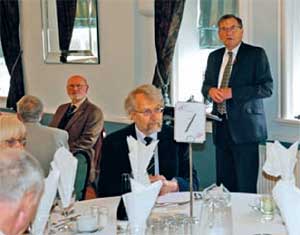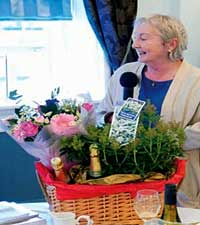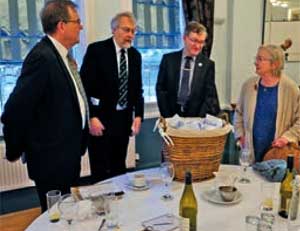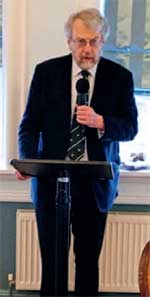Thoroton Society events, November 2021
The Thoroton Society Annual Lunch, 6th November 2021
Long service, lamb shank & laughter: Thoroton’s celebration of John & Barbara
 John Hess speaking to Society members
John Hess speaking to Society membersIn the rush to meet deadlines, catch the last postal collection or see off that urgent email, it’s so important to pause, reflect and celebrate those people who make a big difference. Members of the Thoroton Society grasped that opportunity by toasting two of the Society’s longest-serving stalwarts, Professor John Beckett and Barbara Cast. The annual luncheon at Welbeck Hall in West Bridgford gave members and friends their first opportunity since the Covid pandemic, to give a “big thanks” to John and Barbara for all their work for the Society.
For 28 years, John led the Thoroton Society as its chair from 1992 until last year, when he decided to hand over to Dr Richard Gaunt. Barbara remained as the Society’s Honorary Secretary, but had also decided it was time to hand over many of her duties...including organising the annual luncheon. Would this year’s event pass the Barbara Test? There was no cause to worry. David Hoskins was on the case.
Welbeck Hall and the dining rooms get mentioned in Sir Nikolaus Pevsner’s architectural guide to Nottinghamshire’s landmark buildings. Overlooking the River Trent, “it was built as a Masonic lodge by A.E. Lambert in 1909: A fruity baroque with a cupola,” noted Pevsner and Elain Harwood in her updated 2008 Pevsner guide.
Rounding off an excellent menu that included lamb shank or wild mushroom ravioli, the apple and blackberry crumble (with custard of course) maintained Welbeck Hall’s well-deserved fruity tradition. The food and the Welbeck staff who served were excellent.
Before the formalities of the toasts and the speeches, I ventured a thought about the Society’s namesake, medic and antiquarian Dr Robert Thoroton. What would he have made of the events of the past two years, if he was alive today nearly 400 years since his birth? Would he be one of our exhausted hospital doctors working on the NHS frontline treating Covid patients? Would he have kept his own Covid diary for future historians and researchers to understand how we coped in this pandemic?
David Hoskins, the vice-chair of the Society, invited us to raise a glass for the Loyal Toast to the Queen, and Judith Mills, chair of FONA (Friends of Nottinghamshire Archives) proposed a toast to the health of the Thoroton Society. Judith stood in for our president Adrian Henstock. Both Adrian and his wife Valerie were unable to attend, but they sent their thanks to John and Barbara, and their best wishes “for the good heart and health of the Society”.
In the speeches, (reports follow) there were many kind and touching words about the contribution made to the Society by John and Barbara, as you will read in Richard Gaunt’s account. As a tribute to their contribution over many years, they were both awarded with the title of Vice-President. For John, there was also one of the highest honours from the Society’s Council presentation of the Thoroton Festschrift, a collection of some of his writings over his years as chair. (The book is now on sale to members)
 Barbara Cast
Barbara CastAlso from the Society, there was a gift to Barbara of flowers, bottles of bubbly and - for the garden - a shrub (Pieris Japonica Debutante). John then received a basket of local sourced “goodies”: including a mix of Notts and Vale of Belvoir cheeses, Nottingham ale, a liqueur from Clipstone Park distillery, wines, cereal from Tuxford Windmill ... all neatly covered in a Southwell Minster tea towel.
My take-away as a member “newbie” were the many accounts of John’s remarkable leadership in defending culture and heritage - locally and nationally - that had been in peril or under threat. But who knew about John’s musical and singing prowess, and his expertise on the church organ? Thoroton Council member and University of Nottingham colleague Rob James revealed some intriguing secrets. On this occasion, there was no rousing community singing to end the annual luncheon..but maybe on a future Thoroton coach trip, John can be enticed to lead the chorus!
John Hess, (Master of Ceremonies & Society member)
A transcript of the speeches at the annual lunch
Rob James’s tribute to John Beckett, Chair of the Thoroton Society Council 1992- 2020.
John Vincent Beckett - An Appreciation
 Presentation to John Beckett
Presentation to John BeckettIt is a great pleasure to have this opportunity on behalf of the Society to say 'Thank you' to John for all he has done and achieved for Thoroton and the study of history. It was a great surprise too! The person who Richard Gaunt thought was going to ask me, if I would deliver this appreciation, thought Richard was going to do the asking. Neither did. As the menu cards had been printed, with me named as giving this encomium, I was left with little choice but to agree. For the record, had I been asked, I would have agreed! There are many words which can be used to describe John Beckett - scholar, academic, teacher, research supervisor and mentor are just a few, and to these I would personally add that of 'friend'. I first met John about 30 years ago, on the cricket field, playing for the university staff team. I had recently purchased a copy of his book 'The Aristocracy in England' and had fallen asleep reading it on a train from London. During the course of the game I asked him to give me the 'gist' of the book, and thus save me from having to finish it. I recall he smiled at me with a look of humour - at least that's how I interpreted his expression! He suggested we had lunch, and, as I said to someone only recently, we have been lunching ever since.
In his Introduction to 'Church, Land and People', Richard Gaunt wrote in detail of John's life; his many academic achievements, and of his philosophy and thinking on History and what it should be.
I'd like to highlight a few aspects of that 'career in History'. John joined the Thoroton Society sometime in the 1980s, he assumes, since no one can confirm exactly when. It is known that 'Dr John Beckett' was welcomed as a member of Council, by the then chair, Rosalys Coope, in May 1988. The following year he joined the Editorial Committee, in those days responsible for producing 'Transactions', and on Rosalys retiring as chair of the Society, he was elected to that position at the 1992 AGM.
As the newly elected chair, John set out his vision for what he wanted to achieve for the Society. He wrote in the July 1992 Newsletter that he wished:
'to make the Society truly a County Society, to maintain the scholarly standards of Transactions, to improve communications with members and to try to attract some young members'
I'll leave you to judge if these objectives have been met. I have no doubt that they have been. As Chair he has overseen the development of the Society and under his leadership and guidance, enabled Council members and the membership in general to play an active part in its evolution and growth.
If I may - and you have no choice in the matter - I'd like to draw attention to just a couple of these developments. John has told me he felt that the lack of means of communicating with members was an early, key, issue for him as chair. He had previously suggested the introduction of a 'newsletter' - at first only two pages - before the introduction of which, Transactions and the annual programme card had been the only means of keeping in touch with the membership. He pushed the development of the 'Newsletter', which, under successive editors, has become a vital means of informing and engaging members. Also, through the invention of the Internet we have our website and eBulletin. The importance of which to the Society hardly requires stating. However, within the pages of the website are to be found two highly important resources. Namely the bibliography of published work relating to the history and archaeology of the County and the Nottinghamshire Heritage Gateway, and he introduced the Notts History Lecture into the programme of talks, to be given by a recent Phd student.Just several examples, I feel, which demonstrate John's desire to make 'history' accessible to all. Under his leadership, the Society has embraced social-media. Will this help boost membership?
Highlights of John's time as Chair include the Society's centenary year celebrations in 1997. In which, as Barbara Cast has written, he was a leading and active participant. John told me that visiting the six wapentakes was a particular pleasure for him personally. Whilst all this was happening, he was overseeing, as Editor, the publication of The Centenary History of Nottingham. At the book launch of which, the then University Librarian, Peter Hoare, introduced John as 'our eminent historian'. John is rightly proud of the book. And it is not surprising that, as a result, he and the Society were approached to contribute to the Notts Millenium activities. As chair he has been an active campaigner and champion for the City and the County's history and heritage. Wearing both his 'professorial robes' and his Thoroton 'hat' he has spoken out on behalf of numerous heritage causes. Just a couple of examples, in 1989 John published the definitive study of the village of Laxton. The following year he, together with Professor Maurice Barley, found themselves having to persuade the Society to support action to safeguard the village and its traditional farming methods. It will come as no surprise that the Society backed them 'unanimously'. As we know, John remains closely involved with the village and community through the Laxton Manor Trust and as an adviser on heritage matters.
He is also President of their History Society and annually attends the Court and the Leet. It was whilst surveying the buildings of Laxton, John once told me, that he was instructed by Maurice in how to gain access to ladies' bedrooms, and all in the interests of research! So he said! In 1997 the Society, City Council and Byron Society took up arms against a proposal to undertake mining under Newstead Abbey. John spoke at two public meetings, at one of which he recalls the presence of Michael Foot. To cut the story short, ultimately the plans were dropped, as a result of which, focus shifted to the restoration and maintenance of the Abbey grounds and buildings. During 1997-98 - so much appears to have been 'going on' during this time - Nottingham Museum Service came under threat. Once again, John was vocal in his support, speaking out on the service's behalf, promoting the vital importance of the city's history and archaeology.
1998-2020 Chair, History of Lincolnshire committee
2001-2020 Chair, academic board of Midland History
2001-2005 Chair, British Agricultural History Society
And in addition, he found the time and energy to lecture to local history societies and groups across Nottinghamshire and beyond its boundaries.
As Sir Neil Cossans wrote in his Forward to Church, Land and People
'John has been the mainspring of regional history studies, comfortably inheriting the mantle of his predecessors'
Therefore it can be no surprise that in 2005, he was invited to take up the post of Director of Victorian County History. Seconded from his role at Nottingham, John worked tirelessly over the next five years travelling extensively round England; speaking to groups; chairing meetings; encouraging local researchers and re-energising county projects that had stalled or were stalling. During his time at the VCH more of the 'Big Red Books' and numerous monographs were published. Whilst, locally, work stepped up a pace in Nottinghamshire and Derbyshire.
And through all of this - and commuting to London four days a week - he found the time to continue with his own research, write, publish and supervise doctoral students as well as chairing Thoroton too! On returning to Nottingham in 2010, John's personal research interests were put on hold, when he was invited by the university to write its history. What resulted was a major work of scholarship, which set new standards in the writing of Higher Education institutional histories. This was then followed by his involvement with two major projects, as Principal Investigator - or lead academic. The Hidden Histories of World War One, nationally funded, ran between 2014 and 2019. It brought together many different groups of people, from across the Midlands region, made up of amateur and professional historians, each pursuing with enthusiasm, their interest in uncovering the 'hidden stories' of the Great War. With John's hand on the tiller, much was achieved. The second project was the research conducted into Nottingham's Green Spaces, from which a book is forthcoming.
Come 2020, John took the decision to retire fully from his post at Nottingham. At the same time, and after 28 years, he felt it appropriate to step down as chair of Thoroton. His valedictory professorial lecture - The Cust lecture - should have been delivered in June of that year, and would have been the occasion on which his Festschrift - Church, Land and People: Essays Presented to John Beckett - was to have been formally given. The pandemic put paid to that plan! And it was in 2021 that the lecture took place via Zoom. In recognition of his scholarship and contribution to the study of history, The University of Nottingham granted John the title of Emeritus Professor and conferred on him the degree of Doctor of Letters. Honours given by the university to exceptional people are not awarded lightly.The Thoroton Society have nominated him a Vice President and given him Life Membership, (which I believe entitles him to a free cup of tea at meetings) and of course, the Festschrift; a beautifully produced and worthy volume to mark his dedicated service to the Society and contribution to the wider study of history. However, let me give the final words to Sir Neil Cossons, who wrote:
John Beckett is an outstandingly gifted historian, warmly perceptive and with the capacity to make the most recondite of historical issues come alive. This Festschrift marks not only the respect and high regard in which his many friends and colleagues hold him but reflects their real affection for an enlightening and amiable companion.
Rob James
John Beckett’s tribute to Barbara Cast, Honorary Secretary of the Thoroton Society, 1996-2020
Barbara Cast
 John Beckett addressing the members
John Beckett addressing the membersThe position of Honorary Secretary of the Thoroton Society should be viewed in the same way that we comment on politicians: Home Secretary, Foreign Secretary, and so forth. It is more Chief Executive (unpaid) than Secretary. When the Society was founded in 1897 there were two secretaries. W.P.W. Phillimore took charge of administrative matters and the summer excursion, and Rev John Standish of Aslockton handled the Society’s publications, which at that time consisted of Transactions of the Thoroton Society. These were the days when professional men saw it as part of their social responsibility to take on honorary positions. So John Crosby Warren, a solicitor, was elected as the honorary treasurer. Anglican clergy were prominent in the early days both on the Society’s Council, and among its excursionists. The position of Honorary Secretary evolved over time and was split from the editorship of Transactions. Perhaps most notable was John Holland Walker, a distinguished scholar in his own right, but a businessman who fitted the required work into his crowded schedule. He was Hon Sec 1925-56. Holland Walker was followed by Keith Train, an extraordinary man who somehow combined a full-time post as a teacher of Chemistry at High Pavement School, with enough energy left over to sort out the Thoroton Society, and for a while he was also editor of Transactions. When I first joined Council the Hon. Sec was John Childs who, as I recall, worked for the National Coal Board. He was succeeded by Rev E Patrick Rowley, one of the last working clergy to play a significant role in the society. Patrick was a lovely man, but he was quite incapable of taking a decision without consulting the chairman, i.e. me. The Society, with Rosalys Coope in the chair, had begun holding an annual lunch. It was quite a successful event in terms of numbers, and Patrick was happy to organise it but only if we went to the same place, the Archbishop’s Palace in Southwell, with the same menu - salmon and salad every year! Fortunately for the Society, Patrick did not feel able to handle the tricky task of taking the minutes of Council, and that was where Barbara arrived on the scene. She joined Council in 1994 as Minutes Secretary and two years later succeeded Patrick as Hon Sec. This meant no return to Southwell, and no more salmon salad for the Annual Lunch! Instead, Barbara organised us to go on tour around the county, stopping for lunch at a different venue each year. I think we have only been to the same place twice since she became Hon Sec. Barbara also made sure that we were peripatetic with the AGM. That was a rather stiff and boring event when I joined Council, and most of you will probably say that AGMs always are. But we transformed it by turning it into a Spring Meeting so that an excursion was included with the formal business of the AGM and, of course, the traditional Thoroton tea. We even introduced an officers’ lunch prior to the AGM, which Barbara would organise for a hostelry close to the AGM venue. For many years she would eat her food and then rush off to make sure the hall we were using was ready for us, leaving the other officers to follow at a more genteel pace. I should say that this genteel pace was determined by our late president Neville Hoskins, who always required a pudding!
Barbara brought energy to the position of Honorary Secretary. She came up with ideas and was ready to implement them. She kept me, as chair, under control. She insisted on ‘chair’ not ‘chairman’ to the annoyance of some of the more traditional members of Council, and no one, least of all me, raised any question about the wording of the minutes. She took on other roles too, especially after she retired from her work at Nottingham City Council. She took the lead in making awards under the Geoffrey Bond Research Awards scheme, and she led the Response Group which grew out of her interest in buildings which are in danger of demolition and where plans for new buildings are considered inappropriate. Through the Response Group she turned the society into a campaigning group. Local History groups and similar voluntary societies need someone like Barbara to make things happen, and I am personally grateful to her for all the effort she put into the Society over the 26 years she held the position of Hon Sec. Only occasionally did she give us cause for alarm. One was when she did not turn up on time for a Council meeting. We were just about to dragoon someone on Council to take the minutes when she walked in ... she had arrived early and been reading a book to pass the time, only to omit to check how the clock was moving forward! And second, she organised a special lecture to take place in the Archbishop’s Palace at Southwell, only to drop something rather heavy on her foot with the result that she was whisked off to hospital in Newark and missed the talk! Finally, as Hon Sec much of Barbara’s work was unseen, out of the public gaze, including the time she spent compiling the annual report, but she was always on top of the Society’s business as well as keeping in touch with members, most notably one of our our previous presidents, Dr Rosalys Coope, who she transported to and from events such as the winter lectures when Rosalys had to give up driving. Barbara has done an excellent job over many years and as chairman through that period I would like members of the Thoroton Society to know that the success of the Society did not happen by accident. We may sometimes have been reluctant to change, but we have Barbara to thank for driving us onwards.
Professor John Beckett, (Chair of Council, 1992-2020)
ZOOM LECTURE REPORT
Nottinghamshire History Lecture 13 November 2021
"Elizabethan and Stuart revenue Collection in Nottinghamshire - and the noble and gentry vitriol it generated" by Dr Richard Bullock
Dr Bullock worked on a doctoral thesis at Nottingham Trent University, and the subject was the role and office of the High Sherriff in Early Modern England, focussing on the late 16th and seventeenth centuries. This is the first study to focus so sharply on the office holders and their job. The paper he presented was derived from his research work and focussed on the issue of petty and grander power struggles within the Shreival community. Sheriffs only held their office for a year at a time. It was an onerous task with responsibility for keeping the peace, collecting taxes and assisting with the staging of both quarter session courts and the assize judges and their courts during their twice-yearly visitations. Even when assisted by a deputy or undersheriff (Dr Bullock himself served in the office for many years) the sheriff’s work was difficult, potentially expensive, under-appreciated and often unrewarded. Moreover, it could be political; pricking - the arcane method by which a monarch indicated his/her selection of office holder from a list of those suitable men created by their county - could be used as a means of keeping perceived political opponents out of parliament for a sheriff could not leave the county during the term of his office. Dr Bullock showed that whilst the shrievalty could be used as a collective group of people from whom expertise could be drawn for special tasks, the individuals within that group were often allies but just as often foes. Rival aristocratic families sought at times to impose their choice of candidate and so the post became part of a string of rivalries over the decades. The office itself became more and more difficult in the period of Charles I’s reign before the civil war. Their financial responsibilities involved them in the contentious non-parliamentary taxes and levies - the Benevolence, Forced Loans and of course, Ship Money. Not surprisingly this exacerbated rivalries and antipathy. Dr Bullock explained and illustrated all these facets of the officers and the office. He introduced the men (for in this region they were always men in this period) who held the office, their grievances, their friends and allies and those of whom they fell foul.
In a paper that was informed, in-depth and yet at times humorous, Dr Bullock did these hard put upon, occasionally unfortunate, men a great service by showing what difficult tasks laned upon their shoulders, allowing his listeners to understand their plight more fully.
Martyn Bennett